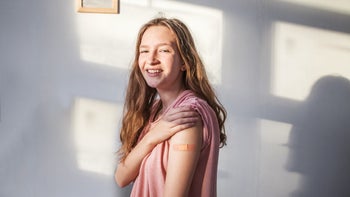Gardasil 9
Gardasil 9 (HPV vaccine) is an FDA approved vaccine that helps protect against certain types of human papillomavirus (HPV). HPV is a virus that can cause genital warts and certain cancers. This vaccine is recommended for all children starting at ages 9 to 14, and it's also approved for adults up to age 45. Depending on your age, you’ll receive 2 or 3 doses. It's given as a shot into the muscle by a healthcare professional. Common side effects include headache and injection-site reactions like pain or swelling.

What is Gardasil 9 (HPV vaccine)?
What is Gardasil 9 (HPV vaccine) used for?
Prevention of HPV infection, which can cause genital warts and certain cancers
How Gardasil 9 (HPV vaccine) works
Gardasil 9 (HPV vaccine) is a recombinant vaccine that helps protect you from human papillomavirus (HPV). It contains pieces of the virus that trigger your immune system to make antibodies against 9 different types of HPV.
If you're exposed to HPV later on, these antibodies help fight off the virus. This can prevent infection and lower your risk of genital warts and certain cancers like cervical, vulvar, vaginal, anal, throat, and other head and neck cancers.
Drug Facts
More on Gardasil 9 (HPV vaccine) essentials

Get your GoodRx coupon

What are the side effects of Gardasil 9 (HPV vaccine)?
Common Side Effects
- Pain at the injection site
- Swelling at the injection site
- Redness at the injection site
- Headache
Other Side Effects
- Fever
- Fatigue
- Dizziness
- Nausea
- Sore throat
- Itchiness at the injection site
- Bruising at the injection site
Serious Side Effects
- Serious allergic reactions: trouble breathing, wheezing, hives, rash
Source: DailyMed
More on Gardasil 9 (HPV vaccine) side effects
The following side effects have also been reported
Side effects that you should report to your care team as soon as possible:
- Allergic reactions—skin rash, itching, hives, swelling of the face, lips, tongue, or throat
- Feeling faint or lightheaded
Side effects that usually do not require medical attention (report these to your care team if they continue or are bothersome):

Pros and cons of Gardasil 9 (HPV vaccine)

Pros
Works very well to protect against genital warts and cancers caused by HPV
Safe and lasts at least 12 years
Can be given at the same time as other vaccines

Cons
Need to receive 2 to 3 injections to complete the series
Must be injected by a healthcare professional
Common side effects include pain and swelling at the injection site

Pharmacist tips for Gardasil 9 (HPV vaccine)

It's important to complete the full Gardasil 9 (HPV vaccine) vaccine series. This gives you the best protection against HPV.
Even if you get Gardasil 9 (HPV vaccine), you still need regular cervical cancer screenings. The vaccine doesn’t replace pap smears or other screening tests.
Gardasil 9 (HPV vaccine) doesn’t protect you from HPV types you were already exposed to through sex. It works best when given before any exposure to the virus. Talk to your healthcare professional to find out if it's still a good option for you.
Fainting has happened after getting Gardasil 9 (HPV vaccine). To stay safe, your healthcare professional might ask you to sit or lie down for about 15 minutes after your shot.
If you notice any unusual or serious side effects after getting Gardasil 9 (HPV vaccine), tell your healthcare professional right away. You can also report side effects to the Vaccine Adverse Event Reporting System (VAERS) at 1-800-822-7967 or https://vaers.hhs.gov/.

Frequently asked questions about Gardasil 9 (HPV vaccine)

How to save using GoodRx




What are the risks and warnings for Gardasil 9 (HPV vaccine)?
Gardasil 9 (HPV vaccine) can cause some serious health issues. This risk may be even higher for certain groups. If this worries you, talk to your doctor or pharmacist about other options.

Fainting
Some people might feel lightheaded or faint after getting Gardasil 9 (HPV vaccine). This could lead to falling and getting hurt. In rare cases, fainting might come with stiffness or shaking, which can look like a seizure. To help prevent injury, your healthcare professional might ask you to sit or lie down for about 15 minutes after the shot.

Severe allergic reactions
Risk factors: Allergy to yeast
In very rare cases, serious allergic reactions like anaphylaxis can happen after getting Gardasil 9 (HPV vaccine). Let your healthcare professional know if you experience trouble breathing, wheezing, hives, or a rash after the injection. Also, this vaccine contains yeast, so tell your prescriber if you've ever had an allergy to yeast or another vaccine made with yeast.

Gardasil 9 (HPV vaccine) dosage forms
Typical dosing for Gardasil 9 (HPV vaccine)
The typical dose is 0.5 mL injected into the shoulder or thigh muscle by a healthcare professional.
Ages 9 to 14 years:
2-dose series: You'll receive one dose at the first visit, then the second dose 6 to 12 months later.
If the second dose is given less than 5 months after the first dose, the third dose should be given at least 4 months after the second dose.
3-dose series: You'll receive one dose at the first visit, the second dose at 2 months, and the third dose at 6 months.
Ages 15 to 45 years:
3-dose series: You'll receive one dose at the first visit, the second dose at 2 months, and the third dose at 6 months.

How much does Gardasil 9 (HPV vaccine) cost?

Gardasil 9 (HPV vaccine) contraindications
Allergy to yeast

What is the latest news about Gardasil 9 (HPV vaccine)?

Gardasil 9 (HPV vaccine) images
Get savings updates for Gardasil 9 (HPV vaccine)
Receive price alerts, news, and other messages from GoodRx about Gardasil 9 (HPV vaccine) and other healthcare topics and relevant savings offers.By providing your email, you consent to receive marketing communications from GoodRx, which may include content and/or data related to men’s health, women's health, reproductive care, or sexual health. You agree to the GoodRx Terms of Use and acknowledge the Privacy Policy. You can unsubscribe at any time.
Browse medications
View AllResearch prescriptions and over-the-counter medications from A to Z, compare drug prices, and start saving.









